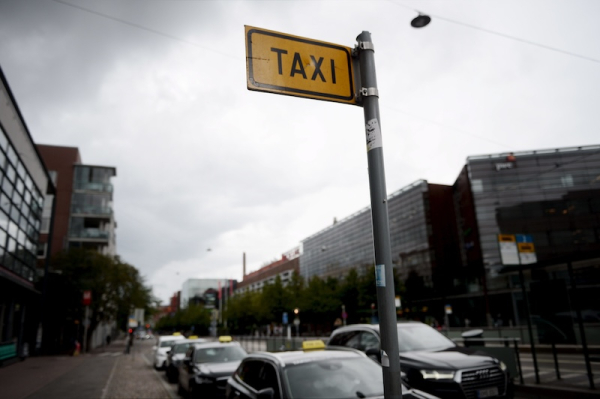
Taxi sign in Helsinki. LEHTIKUVA
- Next Article Fewer summer jobs, tougher competition for Finland’s youth
A taxi driver who assaulted at least 12 women in Finland operated for years without detection, despite victims contacting authorities and evidence being available. The first known victim, Iida Ketola, entered the taxi in central Helsinki five years ago. She was raped on a remote road after the driver diverted the route and isolated her.
The driver continued attacking women for nearly 18 months after the incident, targeting mostly young, intoxicated women late at night.
In several cases, he offered alcohol to obscure victims’ memory and took their phones to prevent them recording identifying details.
Ketola had flagged down what appeared to be a normal taxi displaying a standard yellow sign. After her friend backed out of the ride, Ketola entered alone. The driver quickly began touching her and ignored her intended destination. He drove out of Helsinki to a wooded area.
“There he raped me. At that moment I was sure I wouldn’t survive,” Ketola told Yle.
After the attack, he drove her home. She planned to photograph the licence plate, but the driver opened the boot remotely, hiding the number before speeding off.
She reported the crime, provided a DNA sample and described the attacker. Her phone’s location data and CCTV footage tracked the car. But the driver, Arian Juhana Rezaji, remained unidentified for over a year.
During that time, Rezaji repeated the same methods. Court records state he operated an independent taxi service registered in Lohja and tried to lure several victims to his home. He relied on victims’ trust in the taxi system, exploiting their impaired condition and disorientation.
The Helsinki District Court convicted him of multiple offences involving 12 women, sentencing him to 13 years in prison. Rezaji has appealed the verdict. The Helsinki Court of Appeal is expected to issue its final ruling by the end of May.
His victims reported panic attacks, insomnia, depression, and long-term trauma. Ketola gave up sports and was left physically and emotionally exhausted.
“Everything collapsed in a single day,” she said.
Ketola’s case was confirmed in appeals court two years ago. She credits a support centre for sexual violence victims for her recovery, including access to therapy.
Police finally apprehended Rezaji in April 2021 after he raped a 16-year-old girl. Her phone data revealed the location. Rezaji’s own phone held images of victims’ IDs and other evidence. The case linked previously unconnected incidents. Several victims came forward only after police released a public statement, citing shame and fear as reasons for earlier silence.
Chief Inspector Ritva Elomaa of Helsinki Police said Rezaji avoided detection by not using traditional taxi stands or apps, picking up passengers directly from streets.
“He wasn’t booked from anywhere. These young women had no idea where they were,” Elomaa said.
Rezaji concealed licence plates, removed phones, and drove at speeds that blurred camera footage. He was not in the DNA database, and not all victims filed reports. His earlier offences were only discovered after his arrest, when police found photographs on his phone.
Finland’s 2018 taxi reform deregulated the sector, removing mandatory training and loosening licensing. The number of reported sexual assaults involving taxi drivers rose significantly after the change. In 2023, police received 40 such reports in Helsinki. Last year, the number dropped to 11.
Lähitaksi, one of Finland’s major providers, now trains drivers over five days. Only a third of applicants are accepted. Training covers driving and equipment, but also legal boundaries and customer safety.
“All problems come from not understanding the culture here,” said trainer Tanja Tervalahti.
Despite app-based bookings and GPS tracking, assaults still occur. Reports include unwanted questions, propositions, and touching. Some traditional companies review drivers’ language and conduct, but a criminal conviction during the licence period is not automatically shared with dispatch companies.
Companies like Uber, Bolt and Yango rely on in-app safety features. These include ride tracking, panic buttons, and real-time sharing. They do not offer training but say dangerous drivers are permanently removed from the platform after confirmed reports.
Bolt has proposed automatic alerts from authorities if a driver’s licence is revoked. This would help ensure only qualified drivers remain active.
In most reported cases, suspects had foreign backgrounds. Some were Finnish citizens. Elomaa stressed the importance of integration to align behaviour with societal norms.
“If someone doesn’t feel part of the society, they don’t follow its rules,” she said.
The Finnish Transport and Communications Agency checks criminal records only when a licence is first granted. The permit lasts five years, during which new convictions are not always communicated to employers.
Rezaji remains in custody. During a recent court hearing, he covered his face and presented handwritten notes accusing officials of mistreating immigrants.
His case continues in court. Meanwhile, victims like Ketola are still recovering.
“Eventually, I accepted that I’m allowed to be shattered by this, even though I survived. That helped more than anything,” she said.
HT
- Next Article Fewer summer jobs, tougher competition for Finland’s youth
Source: www.helsinkitimes.fi
